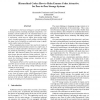Free Online Productivity Tools
i2Speak
i2Symbol
i2OCR
iTex2Img
iWeb2Print
iWeb2Shot
i2Type
iPdf2Split
iPdf2Merge
i2Bopomofo
i2Arabic
i2Style
i2Image
i2PDF
iLatex2Rtf
Sci2ools
137
click to vote
P2P
2008
IEEE
2008
IEEE
Hierarchical Codes: How to Make Erasure Codes Attractive for Peer-to-Peer Storage Systems
Redundancy is the basic technique to provide reliability in storage systems consisting of multiple components. A redundancy scheme defines how the redundant data are produced and maintained. The simplest redundancy scheme is replication, which however suffers from storage inefficiency. Another approach is erasure coding, which provides the same level of reliability as replication using a significantly smaller amount of storage. When redundant data are lost, they need to be replaced. While replacing replicated data consists in a simple copy, it becomes a complex operation with erasure codes: new data are produced performing a coding over some other available data. The amount of data to be read and coded is d times larger than the amount of data produced. This implies that coding has a larger computational and I/O cost, which, for distributed storage systems, translates into increased network traffic. Participants of Peer-to-Peer systems have ample storage and CPU power, but their n...
Related Content
| Added | 01 Jun 2010 |
| Updated | 01 Jun 2010 |
| Type | Conference |
| Year | 2008 |
| Where | P2P |
| Authors | Alessandro Duminuco, Ernst Biersack |
Comments (0)

